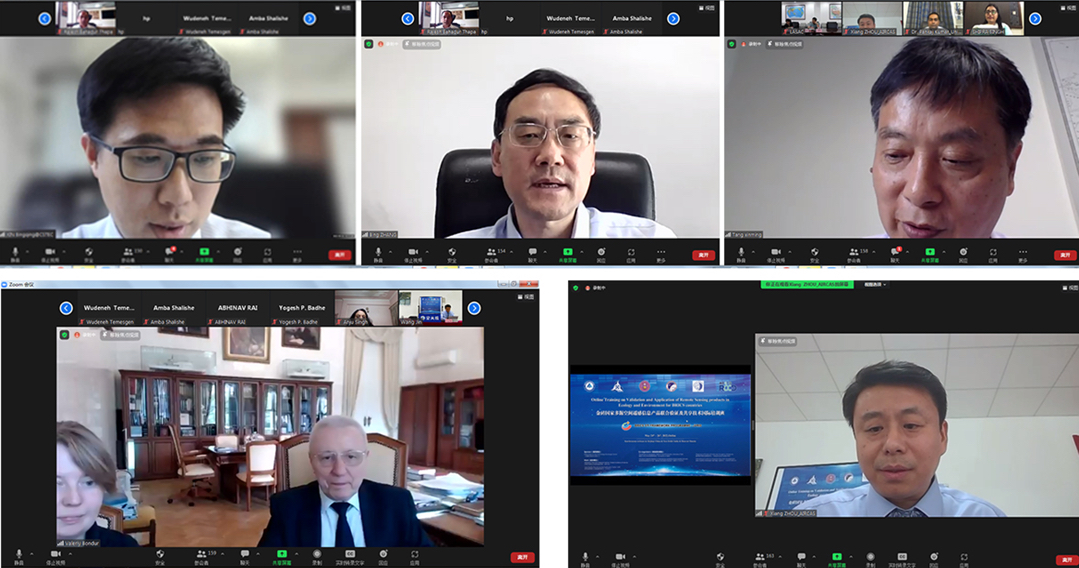Training Workshop of ‘BRICS STI FRAMEWORK PROGRAMME-JVRIS’ Held Online
The Training Workshop and Academic Seminar of Joint Validation of Multi-source Remote Sensing Information and Sharing in BRICS Countries Project (JVRIS) under the BRICS STI FRAMEWORK PROGRAM was successfully held online (synchronous webcast in Beijing, New Delhi, and Moscow) from 24 to 26 May 2022. The event aims to publicize the achievements of the JVRIS project, promote application of Earth Observations in ecology and environment monitoring, and cultivate S&T talents for BRICS countries and other developing countries.
More than 300 trainees from 22 countries including India, Russia, China, Pakistan, Ethiopia and other countries registered for the training workshop. 13 trainers from China, India and Russia gave presentations to promote users' capacity on Earth Observations for Sustainable Development Goals (SDGs).
The teachers consisted of scientists from the Aerospace Information Research Institute) (AIR) under the Chinese Academy of Sciences, the Land Satellite Remote Sensing Application Center under the Ministry of Natural Resources of China, the Department of Geography under University of Delhi of India, the Institute for Scientific Research of Aerospace Monitoring under State Scientific Institution of Russia, the Geophysical Center of the Russian Academy of Sciences, the International Centre for Integrated Mountain Development (ICIMOD, Nepal) and the Peking University of China.
The training lectures covered five sessions including "retrieval methodology of remote sensing products & platform of information sharing", "validation of land spectral reflectance products and its applications", "validation of NDVI products and its applications", "validation of water quality products and its applications", "validation of land cover products and its applications" and "validation of land surface temperature products and its applications".
Since the launch of the project of BRICS STI Framework Program - JVRIS in 2020, the joint project team has made remarkable achievements on joint validation of typical quantitative remote sensing information products, including the technology of collaborative observation of multiple ground sites the method for obtaining ground truth value of heterogeneous land surface, and the scaling up technique of ground points based on prior knowledge.
The Russian team carried out the joint validation of NDVI (normalized vegetation index) remote sensing information products in the forest covered areas in the northeast of Russia for the first time by using the Chinese high-resolution satellites GF-1 B/C, which provided important data resources and professional technical guidance for the optimization of the retrieval algorithm of NDVI products in the region and the application of ecological environment monitoring.
The Indian team and the Chinese team jointly completed the layout of ground sample points and the design of optimal sampling strategy for remote sensing validation field experiment in the mountainous areas of India and carried out cross validation for remote sensing products such as land cover types retrieved by multi-source remote sensing satellites. The joint research results of the project have promoted the high-level applications and the sharing practice of China's remote sensing satellites in the BRICS countries.
Prof. Valery G. Bondur, Vice President of the Russian Academy of Sciences, said that the project has made important contributions on the validation technology of remote sensing products and the sharing of remote sensing information through the joint efforts of colleagues from China, Russia, and India.
He also appreciated the role of this training workshop in promoting scientific and technological innovation of BRICS countries and enhancing the users' capacity on Earth Observations to deal with ecological environment changes and regional sustainable development.
The Regional Centre for Capacity Development under AOGEO (AOGEO-RCCD) expressed that RCCD will provide more training network resources for developing countries, including BRICS countries.


A snapshot of the online workshop.



News & Events